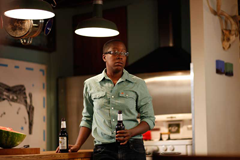|
The Paliament Film Collective's (Partial) Canon of Lesbian Cinema |
||||
 |
||||
Carol (Cheryl Dunye). Still from The Owls (dir. Cheryl Dunye, 2010). Used with permission from the Parliament Film Collective. |
||||
A Lesbian Collective Aesthetic:
Making and Teaching The Owls
Page 3 of 6
While much feminist/queer cinema scholarship has been productively devoted to the theoretical and formal nuances that might define a feminist/lesbian cinema, I choose to add to these conversations not more critical nuances, but the element of collective production that was central to The Owls. I will allow queer filmmakers to explain their motivations, practices, and aesthetics and will suggest that these are visible in the text we collectively produced. In this way, this effort differentiates itself from and hopes to augment more “theoretical” discussions of lesbian film by looking to filmmaking practices and filmmakers’ influences as conscious, self-aware articulations of theory (and politics) in their own right. Let me be clear: the vast majority of members of the Parliament Film Collective have studied (and/or taught) academic film/queer/feminist theory and history in Women’s Studies, Queer Studies, English, Creative Writing, Dance, or Media Studies classrooms. Scholarly ideas inform our work at every level. However, in The Owls, these academic and political concepts are translated into the forms and practices that best suit feature filmmaking and lesbian cultural production—our collective lesbian film aesthetic—rather than the classroom, textbook, or even scholarly article.
That is why this essay also includes five video clips and further writing by the Collective members who chose to participate. Via their biographies and some video clips, you will hear more in this essay from eleven members of the Collective: the director, producer, and actor Cheryl Dunye; screenwriter Sarah Schulman; producer and production designer Candi Guterres; editor and producer Agusta Einarsdottir; actor V.S. Brodie; photographer, data and information transfer, production assistant, and craft services crew member Love Ablan; sound mixer Campbell; propmaster, set dresser, and production assistant Tania Hammidi; cinematographer Alison Kelly; and actor Michael Lucid. In the first video component, you see and hear several members of the Parliament Film Collective (the ones who could afford to get to Berlin…) publicly discuss our work on the film at a question-and-answer session after the premiere of The Owls at the Berlinale Festival.
The Owls, Q & A at the Berlinale, part 1a [5:16]
The Owls, Q & A at the Berlinale, part 1b [4:12]
Featuring: V.S. Brodie, actor; Cheryl Dunye, director, producer and actor; Agusta Einarsdottir, producer and editor; Candi Guterres, producer and production design; Alexandra Juhasz, producer; Sarah Schulman, screenwriter
These clips introduce and model four concerns about lesbian cinema that are central to this essay: 1) a commitment to collective authoring and process leads to alternative forms, 2) the work and description of production are integral to constructing and understanding a lesbian aesthetic, 3) an assurance that in the age of digital technologies, lesbian cinema is easier to make and distribute and takes on a variety of forms (including YouTube interviews as well as low-budget features), and 4) people who self-identify otherwise can participate in the development of lesbian cinema. Two of the collaborators on the Berlin stage for the question-and-answer session do not currently identify as lesbian even if we have in the past, and even as we are committed to lesbian cinema—I identify as queer and Guterres as third-gender. While such digressions in certain contexts might seem unnecessarily personal and thus beside the point, I insist that understanding the personal and political connections and gaps between self-naming and the political project of visibility production are critical for making sense of the current state of lesbian (or queer) cinema, The Owls serving as only one example. My earlier examples about the unnaming of blackness serves as one example of this conversation, while conflicting debates among the OWLs about the necessity of the naming of trans in the film did as well.
Copyright © 2014. All rights reserved.